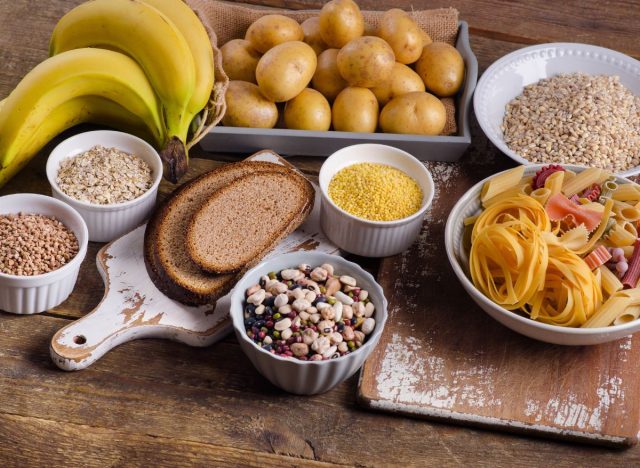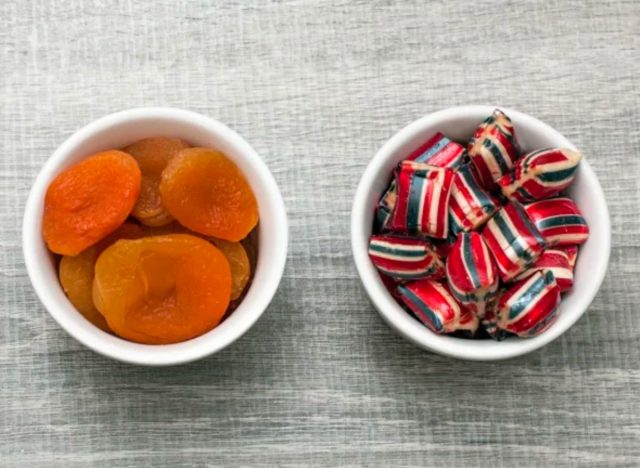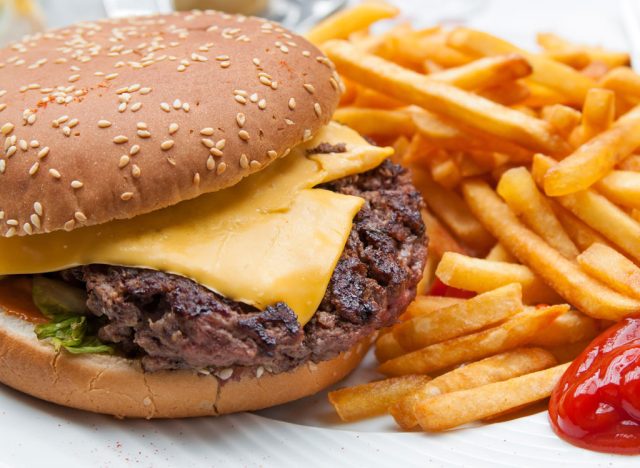Are Carbs Making You Gain Weight? Here's What Dietitians Say

When it comes to the underlying causes of weight gain, there are countless factors that can play into this. Over the last few decades, carbohydrates (aka carbs), in particular, have cultivated somewhat of a controversial reputation, leaving many to wonder whether or not carbs can make you gain weight. This is why many low-carb diets have been part of the zeitgeist longer than you might have even realized. Although the science behind understanding how carbs affect weight may seem rather modern, low-carb diets have existed since the 1860s. Of course, just because low-carb diets have endured, that doesn't mean that everyone attempts to keep their carb intake low.
In fact, in a national cross-sectional study that was published by JAMA in 2019 that included 43,996 adults, researchers found that only 9% of the average American daily diet was made up of high-quality carbs from sources like fruits and whole grain foods. On the other hand, a staggering 42% of daily calories appeared to come from low-quality carbs. (Yikes!)
Although this might make you assume that it's best to immediately and perhaps drastically cut down on the number of carbs you consume, that's not necessarily true. Frankly, there are a few things that dietitians would like you to know about carbs, including what they are, how they can impact both your health and your weight, as well as how to find just the right balance when it comes to including carbs in your daily diet.
So, are carbs making you gain weight? To find out the answer to this question and also better understand the correlation between carb consumption and weight, we turned to the experts.
What are carbs?

"Carbohydrates are one of the three macronutrients that provide the body with energy in the form of calories," Amy Goodson, MS, RD, CSSD, LD, and member of our Medical Expert Board, tells Eat This, Not That! "They are divided into three categories: Fiber, starch, and sugar. Most carbohydrates are broken down into glucose in the digestive process except for fiber—fiber does not digest, and instead, feeds the friendly bacteria in the digestive system."
Goodson also explains that carbs "provide the body with energy in general and during exercise, as well as help keep blood sugar stable."
"High-fiber carbohydrates help your gut by providing prebiotic fiber that feeds good bacteria," says Goodson. "And some carbohydrates also provide soluble fiber, which can help with the maintenance of healthy cholesterol levels."
A look at the types of carbs

You may think of all carbs as the same thing. However, there are two distinct kinds of carbs, which each come from various sources. They also have a very different impact on your body.
Complex Carbs
The first type of carb you should be aware of is complex carbs.
"Complex carbohydrates are made up of sugar molecules in long chains," explains Toby Amidor, MS, RD, CDN, FAND, award-winning nutrition expert and Wall Street Journal best-selling author of the upcoming Up Your Veggies: Flexitarian Recipes for the Entire Family."They can be divided into two groups: starch and fiber. Starches include potatoes, rice, and pasta, while fiber includes vegetables like broccoli and cucumbers, and whole grains like brown rice."
"Simple carbs are the other group in the carbohydrate category that is composed of monosaccharides (single sugars) and disaccharides (double sugars)," says Amidor.
Some examples of complex carbs include fruit, honey, and dairy products like milk.
Refined Carbs
Next, there are refined carbs.
"Refined carbs are more processed and stripped of fiber, and various other nutrients (although some refined carbs are fortified with additional nutrients) and, because of that, are digested more rapidly," says Lisa Moskovitz, RD, CDN, the CEO of The NY Nutrition Group and author of The Core 3 Healthy Eating Plan, and member of our Medical Expert Board. "Refined carbs include refined flour and added sugar."
"When you have a whole grain, it has three parts: the bran, germ, and endosperm (the starchy part). A whole grain has all these parts intact," explains Amidor. "However, a refined grain only includes part of the grain—the starchy part—and not the whole grain."
"The grains used in these products are stripped of many of the nutrients found in the whole grain," Amidor adds. "[Because of this], you see the word 'enriched' in many refined products, as the food manufacturer added back in many of the nutrients that were lost."
Examples of refined carbs include white rice, white pasta, and white breads like traditional pizza dough and pastries.
How carbs might make you gain weight

"If you consume large portions of any sort of carb (complex or simple) or too many carbs throughout the day—that can lead to overconsumption of calories—and over time, weight gain," says Amidor.
On top of that, Amidor claims that "choosing refined high calorie, high added sugar, and high saturated fat carbs (like cakes, cookies, pastries) can easily rack up the calories and can lead to weight gain over time."
This is why—much like any other food—consuming carbohydrates within a healthy context boils down to selecting quality carbs and eating them in moderation as part of a nutritious, well-balanced meal.
Finding a healthy balance

Just like many things in life, when it comes to healthy carb consumption, it's all about balance and moderation. Although too many carbs can be an issue, the same can be said of not getting enough healthy carbs in your diet.
"While you can survive on a very low-carb diet, you might find that not eating enough carbs can cause poor energy, fatigue, irritability, and increased cravings for carbs or sugar," says Moskovitz. "Carbs also supply fiber which is an essential nutrient that is imperative for gut health and digestion regulating, as well as fending off degenerative diseases like diabetes and cardiovascular disease."
To achieve a healthy balance, Moskovitz advises that you "focus on choosing higher fiber carbs that are digested more slowly, and therefore keep you more full for a longer period of time. These include fruits, vegetables, beans, lentils, and whole grains," she adds. "The more nutritious and fiber-rich carbs you consume, the less likely you are to eat past comfortable fullness."
Beyond that, Moskovitz recommends "balancing your carbs with plenty of digestion-slowing fats such as nuts, seeds, extra virgin olive oil, and anti-inflammatory organic avocado oil, along with lean protein such as fish, eggs, and poultry."
"It's recommended that half your carbs recommended should come from whole grain sources. Veggies and dairy have their own groups, but they do provide carbs along with other nutrients, too," says Amidor.
"The 2020–2025 Dietary Guidelines for Americans and USDA's MyPlate provide guidelines for men and women on how many carbs they should be eating," Amidor adds. Although there's no "one-size-fits-all" solution for precisely how many carbs men and women should eat, generally speaking, this hinges on your age, current weight, how active you are, your medical history, and other factors.
Your lifestyle, in particular, and the degree of physical activity you engage in each day can greatly impact the amount of carbs you should consume daily.
"Carbohydrate need is based on the amount of exercise you do; move a lot, you need more carbohydrates, move less, you need less carbohydrates," explains Goodson. "Think about it like a car; the more you drive your car around, the more gas you have to put in it to keep it fueled. [It's the] same concept."
Goodson also shares advice on how to best determine the right amount of carbs for fueling your body.
"A good rule of thumb to follow is, if you are active and workout multiple times a week, at meals make 1/3 of your plate whole grain carbohydrate, 1/3 lean protein, and 1/3 vegetables," says Goodson. "If you are looking to lose weight, tweak your plate to be 1/4 of your plate whole grain carbohydrate, 1/4 lean protein, and 1/2 vegetables; this will help you fill up on more fiber for fewer calories.
"Then it is important to incorporate a high-fiber carbohydrate or fruit with a protein or healthy fat at snacks," adds Goodson. "Greek yogurt with berries, whole grain crackers with cheese, a 100% whole grain granola bar and beef jerky, an apple with 1–2 tablespoons of peanut butter, etc.," she suggests.
- Source: https://www.ncbi.nlm.nih.gov/books/NBK537084/
- Source: https://jamanetwork.com/journals/jama/fullarticle/2751719
- Source: https://www.sciencedirect.com/topics/agricultural-and-biological-sciences/monosaccharide
- Source: https://www.sciencedirect.com/topics/nursing-and-health-professions/disaccharide
- Source: https://www.dietaryguidelines.gov/resources/2020-2025-dietary-guidelines-online-materials
- Source: https://www.myplate.gov/
- Source: https://www.mayoclinic.org/healthy-lifestyle/nutrition-and-healthy-eating/in-depth/nutrition-rules-that-will-fuel-your-workout/art-20390073









